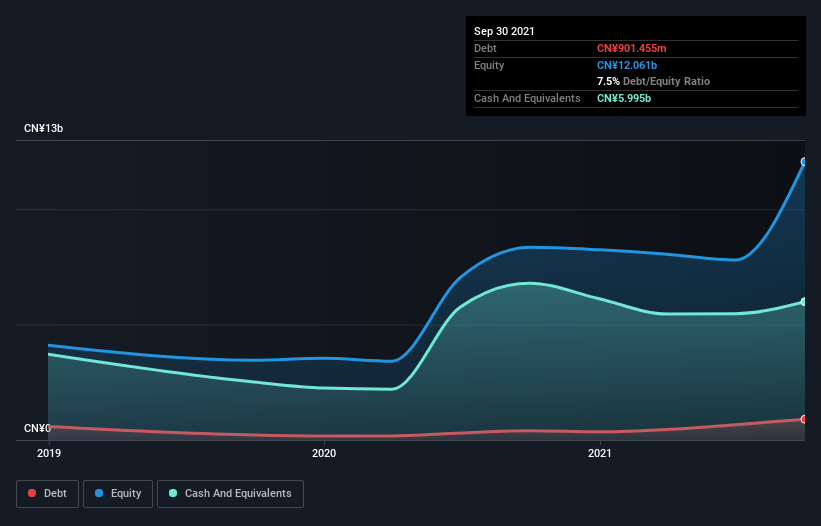
The external fund manager backed by Berkshire Hathaway's Charlie Munger, Li Lu, makes no bones about it when he says 'The biggest investment risk is not the volatility of prices, but whether you will suffer a permanent loss of capital.' It's only natural to consider a company's balance sheet when you examine how risky it is, since debt is often involved when a business collapses. We can see that Kingsoft Cloud Holdings Limited (NASDAQ:KC) does use debt in its business. But is this debt a concern to shareholders?
What Risk Does Debt Bring?
Debt and other liabilities become risky for a business when it cannot easily fulfill those obligations, either with free cash flow or by raising capital at an attractive price. If things get really bad, the lenders can take control of the business. However, a more frequent (but still costly) occurrence is where a company must issue shares at bargain-basement prices, permanently diluting shareholders, just to shore up its balance sheet. Having said that, the most common situation is where a company manages its debt reasonably well - and to its own advantage. When we think about a company's use of debt, we first look at cash and debt together.
See our latest analysis for Kingsoft Cloud Holdings
What Is Kingsoft Cloud Holdings's Net Debt?
The image below, which you can click on for greater detail, shows that at September 2021 Kingsoft Cloud Holdings had debt of CN¥901.5m, up from CN¥402.8m in one year. However, it does have CN¥5.99b in cash offsetting this, leading to net cash of CN¥5.09b.

How Strong Is Kingsoft Cloud Holdings' Balance Sheet?
The latest balance sheet data shows that Kingsoft Cloud Holdings had liabilities of CN¥5.93b due within a year, and liabilities of CN¥2.11b falling due after that. Offsetting this, it had CN¥5.99b in cash and CN¥4.70b in receivables that were due within 12 months. So it actually has CN¥2.65b more liquid assets than total liabilities.
It's good to see that Kingsoft Cloud Holdings has plenty of liquidity on its balance sheet, suggesting conservative management of liabilities. Due to its strong net asset position, it is not likely to face issues with its lenders. Simply put, the fact that Kingsoft Cloud Holdings has more cash than debt is arguably a good indication that it can manage its debt safely. There's no doubt that we learn most about debt from the balance sheet. But ultimately the future profitability of the business will decide if Kingsoft Cloud Holdings can strengthen its balance sheet over time. So if you're focused on the future you can check out this free report showing analyst profit forecasts.
Over 12 months, Kingsoft Cloud Holdings reported revenue of CN¥8.3b, which is a gain of 43%, although it did not report any earnings before interest and tax. With any luck the company will be able to grow its way to profitability.
So How Risky Is Kingsoft Cloud Holdings?
Statistically speaking companies that lose money are riskier than those that make money. And the fact is that over the last twelve months Kingsoft Cloud Holdings lost money at the earnings before interest and tax (EBIT) line. And over the same period it saw negative free cash outflow of CN¥1.9b and booked a CN¥1.2b accounting loss. However, it has net cash of CN¥5.09b, so it has a bit of time before it will need more capital. Kingsoft Cloud Holdings's revenue growth shone bright over the last year, so it may well be in a position to turn a profit in due course. Pre-profit companies are often risky, but they can also offer great rewards. When analysing debt levels, the balance sheet is the obvious place to start. But ultimately, every company can contain risks that exist outside of the balance sheet. For example - Kingsoft Cloud Holdings has 3 warning signs we think you should be aware of.
At the end of the day, it's often better to focus on companies that are free from net debt. You can access our special list of such companies (all with a track record of profit growth). It's free.
If you're looking to trade Kingsoft Cloud Holdings, open an account with the lowest-cost platform trusted by professionals, Interactive Brokers.
With clients in over 200 countries and territories, and access to 160 markets, IBKR lets you trade stocks, options, futures, forex, bonds and funds from a single integrated account.
Enjoy no hidden fees, no account minimums, and FX conversion rates as low as 0.03%, far better than what most brokers offer.
Sponsored ContentValuation is complex, but we're here to simplify it.
Discover if Kingsoft Cloud Holdings might be undervalued or overvalued with our detailed analysis, featuring fair value estimates, potential risks, dividends, insider trades, and its financial condition.
Access Free AnalysisHave feedback on this article? Concerned about the content? Get in touch with us directly. Alternatively, email editorial-team (at) simplywallst.com.
This article by Simply Wall St is general in nature. We provide commentary based on historical data and analyst forecasts only using an unbiased methodology and our articles are not intended to be financial advice. It does not constitute a recommendation to buy or sell any stock, and does not take account of your objectives, or your financial situation. We aim to bring you long-term focused analysis driven by fundamental data. Note that our analysis may not factor in the latest price-sensitive company announcements or qualitative material. Simply Wall St has no position in any stocks mentioned.
About NasdaqGS:KC
Kingsoft Cloud Holdings
Provides cloud services to businesses and organizations primarily in China.
Reasonable growth potential with mediocre balance sheet.
Market Insights
Community Narratives



